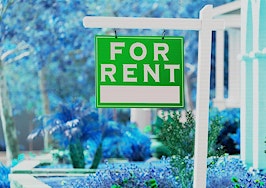With people across the country moving in record numbers, it might motivate others to do the same. Selling a home and packing up for a dream destination might seem rather easy right now.
As homes sell at lightning speed across the country, many homeowners think it will be easy to pull stakes and plant themselves elsewhere. After all, the neighbors’ homes up the street all sold in one day with multiple offers.
As advisers to our clients, here are 13 things buyers should consider before moving on to another destination and how you can advise them along the way.
1. Are you suffering from the ‘grass is greener’ syndrome?
There is a saying that “the grass may be greener on the other side, but it is just as hard to mow.” With stories of everyone moving to allegedly “greener pastures” — the beach, the mountains, the desert, the country — tell buyers to do their research and use caution.
Advise clients
Are you making a decision based on a vacationer’s view of an area, or have you spent enough time in your desired destination to fully understand the pros and cons?
Make a list of the pros and cons of moving to the new locale along with a list of unknown issues.
2. Is there available inventory for rent or sale?
The downside of trying to sell in an “up” market is the speed of which it all happens and the pressure buyers might be under to make a quick decision in their new destination.
Advise clients
Be sure to have a realistic grip of the availability of housing for sale or for rent within your budget, and be willing to rent an apartment, if necessary to buy you some time to figure things out. Although no one likes to move twice, it might be a necessity in some markets with so little for sale and very competitive rental markets.
Remember, a shortage of available inventory typically has existing residents scrambling who might have to sell to buy and needing interim housing as well.
Financial decisions made under the pressure of supply-and-demand constraints often create a challenging situation. The more educated about the reality of the situation you are, the more prepared you will be.
3. How has the area’s growth, infrastructure and development changed?
Although many cities and towns large and small have become hot new destinations; the mass migration of people from one area to another often creates a new set of problems.
Advise clients
If there are a ton of new subdivisions being built, here comes the traffic. Seemingly quiet towns or smaller cities now have congestion to deal with that they never planned for.
Limited roadways might make it frustrating to get from point A to B, and endless road construction might be something that you will have to contend with as the infrastructure struggles to keep up with the pace of growth.
With fewer people commuting right now and many schools doing remote learning or some combination thereof, you might not see the reality of these issues as you might during other times, but with a new slew of COVID vaccines on the horizon, the world could be returning to some level of normalcy within the next year or two.
That cute little town you’ve always dreamed of living in may suddenly not feel so quaint once all gets in full swing again.
4. What is the state of the schools?
With a plethora of new construction also comes issues with attendance zones for existing schools and new ones being built. This might mean that kids could get shifted around for a few years as an area expands and new schools are being established.
Advise clients
Despite what you might find out in regards to what school a new neighborhood attends, expect that to likely change and adjust accordingly. Talk to the school district to get the scoop on what is happening and what the plans are for more schools down the road.
5. What is the cost of living?
One of the biggest driver’s of relocating is often determined by the cost of living. When crunching the numbers, things often come out to a six of one, half dozen of another proposition.
Advise clients
What might appear seemingly less expensive in one place compared to where you are moving from might have other costs associated with living there that you didn’t anticipate.
Will there be additional heating and cooling costs that you didn’t have before? If you are moving to the great white North, consider heating costs, insulation and snow removal. Will you handle yourself, or will you need to get a service for that? What about other associated costs with home maintenance from living in a harsher weather environment?
If you are heading to a resort area like Florida, expect to run the air conditioning nine-plus months out of the year. If you are buying a home with a pool, the pool pump will need to kick on and run around eight hours a day, which translates into an automatically higher electric bill.
Don’t forget to budget for weekly pool service either, or at least until you can get schooled in what you need to do, assuming you are willing to take that on.
In Florida, it’s all about the lush landscaping and running the irrigation system, which might result in a higher water bill than what you might expect. Then, there are costs associated with lawn maintenance, weed management, pest control and termites.
A significant amount of homes in Florida are in homeowners’ associations and gated communities, so factor additional fees for those things.
Thinking of going with a more turnkey option like a condominium? Those too can often come with high monthly fees, particularly when they have amenities, which is often why people want to buy a condominium in the first place. Clubhouses, pools, fitness centers and such add up cost wise.
There is always the risk of special assessments that can also add to your monthly bill or a heft contribution to the condo association. Insurance costs for the complex often make up a significant portion of the monthly dues.
Speaking of insurance, if you are buying in an area that has been prone to natural disasters whether that be hurricanes, floods or fires, you might find insurance costs are significantly higher than what you anticipated.
Do your due diligence ahead of time so you can understand how much homeowner’s insurance will be so you are not sticker shocked later.
Take some time to fully understand what the true costs are associated with living in your desired destination. When you add it all up, it might not be as inexpensive as you initially thought.
6. How far will your money go?
Speaking of costs, with real estate prices soaring in many markets across the country, buyers might have to spend more than anticipated to get what they want.
Advise clients
If you have been considering a relocation to a new area for some time, you’ve likely watched prices skyrocket within the past six months and inventory levels drop.
Choices might be limited, and multiple offers common. Budget extra money, or be willing to compromise to get what you want.
7. Are medical services available?
Now more than ever, access to medical service providers is critically important. Buyers should take a deep dive into the availability of doctors, specialists and other medical professionals that you will need to call upon.
Advise clients
Will your insurance provide access to the service providers you need in your new destination? Are there adequate providers to choose from, and are the doctors and dentists in your soon-to-be new area taking new patients? What is the proximity of getting to medical offices and hospitals?
These are not things you want to learn the hard way when you have a time-sensitive need for one.
8. What about contractors and service providers?
What is the availability for contractors, repair people and a good cleaning crew, for example?
Advise clients
If you are considering a move to an area with a huge influx of residents, there could be an inordinate amount of remodeling and building happening, and you could discover the contractors everyone recommends (and even the ones that don’t get five stars) are completely backed up and not available.
Finding a good contractor or repair person can always be challenging, no matter where you live, but it becomes even more stressful when moving to an area that you don’t know that well.
If you are moving to a smaller community, there might only be so many people who do the kinds of work that you need, so choices will be limited. The wait time for getting someone out could be much longer than anticipated.
Buying a home with grand visions of renovating it might sound exciting, but not if you are going to have to wait at least six months to get someone to do the work.
The same goes for adding a pool, where in a place like Florida, many people moving to the area consider that amenity a must-have. As a result, pool contractors are backed up for months so it might be simply having to take a number and waiting if you can’t find an existing-pool home that meets your needs.
9. Are there job opportunities and remote work?
The ability to work remotely has served as the catalyst for many people to have the ease to pick up and move in our current environment. However, what if the ability to work remotely does not last forever?
Advise clients
What if regular travel will be required to the employer’s location? Does the area have other opportunities for jobs if you needed to make a career change? Are there major colleges and universities nearby that can serve as a resource for training, classes and networking should online learning options lessen as in-person learning resumes?
10. How are state and local governments handling things?
When times are good, it’s easy not to pay as much attention to how local and state governments handle day-to-day issues. In our current climate, the pandemic, election and economic challenges have highlighted the varied approaches to handling these situations.
Advise clients
Some areas have gone to more stringent requirements than others. Although every state has a myriad challenges each is facing right now, it’s important to take a closer look to understand the governmental dynamics of wherever you choose to live and how that could impact your day-to-day life.
Although these are things you might never have thought about before, it’s important to understand how a state’s unemployment system is run, for example, and what access to services you might need in the future. This is particularly critical if this is an area you plan to also retire in or bring an elderly family member to live with or near you.
11. What are taxes, fees and gotchas?
Every state has various costs, taxes and other fees associated with living there.
Advise clients
Make sure you get a grip on what those are before making the decision to move in or out, should you eventually leave. Some states have an exit tax, some cities or counties have a hefty transfer tax when real estate changes hands and some states impose taxes on mortgages and the sales price.
Take time to understand the income tax rate as well as the property tax rate, and understand how or much or when it can go up when a property sells or values increase.
Also research if the state you’re relocating to affords any kind of property tax exemptions that may be available to you as the owner of a primary residence, senior citizen, widow, veteran, etc.
12. Are residents truly year-round, or is it a seasonal community?
If you plan to relocate to a new destination with the intention of living there full time, this is important to consider. Some places that used to be seasonal have become increasingly more year-round, but there could be some dips during certain times of year where people leave.
Advise clients
If an area’s population varies depending on time of year, that can also impact your ability to enjoy the area’s amenities, restaurants, country clubs, etc. Certain times of year might be busier than others, so booking a tee time at a local golf course might prove more challenging.
Private membership clubs might have swelled with members as a result of the pandemic, and there could be increased initiation fees due to the demand as well as waitlists.
At the same time, if an area tends to empty out, there might be reduced hours for shops and services or some businesses might close altogether for a particular “season.” You might not want to move into a new neighborhood only to discover the lights might be on, but no one is home for months on end.
13. What are the time and costs involved with moving?
The downside of the moving boom is the difficulty you might find with being able to book a moving truck to your desired destination. In addition, due to the demand of going to certain locations, the costs might be much higher for some places versus others.
Advise clients
Contact various moving services to inquire well ahead of time of your actual move date to find out how much lead time is needed and to get an approximate quote for your move.
Be careful when researching various movers as many suspect companies have cropped up trying to take advantage of the demand. This will allow you to plan ahead so you are not left scrambling at the last minute and you can avoid making a rash decision with a less than reputable provider.
Relocating to a new area is always a risk, and you might never have all the answers before making the move. Transitions are never easy, and the more information you can uncover ahead of time, the better prepared you will be to handle the bumps in the road that often happen during a move to a new destination.
Cara Ameer is a broker associate and global luxury agent with Coldwell Banker Vanguard Realty in Ponte Vedra Beach, Florida. You can follow her on Facebook or Twitter.









